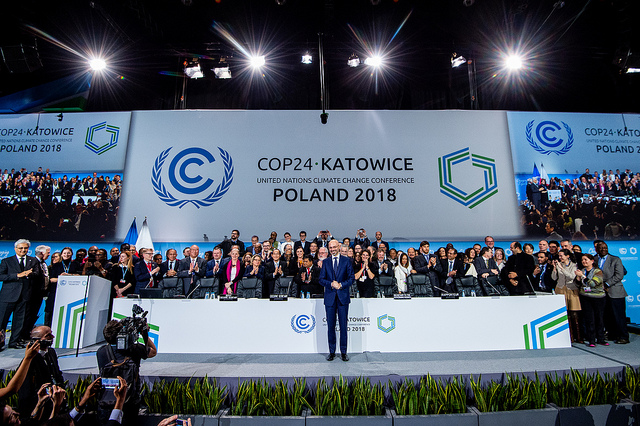Source: © cop24.gov.pl
The need for global decarbonisation is a fact of life and climate change is now at the forefront of the global political agenda. It was one of the key issues at the recent G20 meeting in Buenos Aires and, in the last two weeks, has brought together almost 200 countries at the COP24 summit in Katowice (Poland),with the aim of writing the “small print” with which to implement and make the Paris Agreement truly operational. That common roadmap was finally obtained on Saturday, and has had to leave out issues such as trading greenhouse gas emissions quotas between countries, postponed for the 2019 summit in Chile.
The negotiations have been extremely complicated. No one can escape the fact that climate change is not just an environmental issue, but a largely geopolitical one. In Katowice, factors as relevant as the trade war between China and the United States or the scepticism of Jair Bolsonaro, who not only refused to host the next COP in Brazil, but also threatened to leave the Paris Agreement, have been on the table. France, for its part, is suffering from the crisis of ‘yellow vests’, which is not just a matter of ecology and fuels, but a broader political, economic and social issue.
Poland, host for the third time of a COP, has been one of the great defenders of a “fair transition”, as a country that depends almost 80% on coal and with more than 112,000 people working in the sector -compared to 6700 in Spain, for example- according to data from the European Commission.
Spain has positioned itself among the countries with the most demanding objectives and, as a result of this commitment, the Minister for the Ecological Transition, Teresa Ribera, was named as one of the “facilitators” who have contributed to unblocking the summit negotiations.
Coinciding with COP24, we learned that 2018 will end with a record level of global carbon dioxide emissions, which last year increased by 1.6% and are expected to rise by more than 2% this year, mainly because global energy demand is growing above decarbonisation efforts. China is the largest emitter, responsible for 27% of global CO2 emissions, followed by the United States.
Faced with this complex panorama, and without wishing to be pessimistic, as I believe we are on the right track, the fight against climate change must move on to immediate action in addition to setting major objectives for 2050. Let’s think with a three-pronged approach -the environment, people and also economic sustainability- let us be realistic and practical, and take steps in what we can do today, not forgetting that there are still millions of people in the world without access to energy.
One of the main challenges, and one area in which we can act now, is transport, which today accounts for 25% of CO2 emissions in Europe and which goes beyond the vehicles that circulate in our cities.
The use of LNG as fuel for transport, especially maritime transport and also railway, is a reality and will be consolidated in the coming years. The project CORE LNGas hive led by the Spanish Ports Authority and coordinated by Enagás is a good example of that. It would be unwise to give up an already available technology, which allows us to reduce CO2 by 30% and also completely eliminate SOx and particulate emissions and 85% of NOx, immediately improving the quality of the air we breathe. The same applies to road heavy transport, which today has gas as its best ally for decarbonisation.
The big challenge is what will happen from 2030 onwards. In order to be emissions neutral by 2050 we will have to take a much greater leap and we will need to apply more innovation and technology, emission-free gas, that is, renewable gases. We have them: biogas, biomethane and hydrogen are clean energies that we are already developing and that have enormous potential, which I explained a few months ago in the post “Non-electric renewables: a sustainable alternative in moving towards decarbonisation”.
For these non-electric renewable energies to be useful they need to be transported throughout Spain and Europe, and a viable alternative for this is to do so through the existing gas infrastructure network.
Both renewable gases and the new uses of natural gas for more sustainable mobility are aligned with the ambitious goals to combat climate change that Spain expressed at COP24. With the appropriate impetus and development, these cases can play a key role in the effective fulfilment of the objectives set.
Companies are aware that we must continue to transform ourselves and provide creative solutions if we want to be part of the more sustainable future that is being built. The energy transition requires a broad and long-term vision, but also decisive and firm steps to do as much as we can now.
